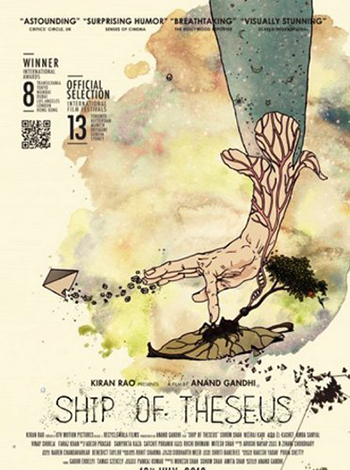 The Ship of Theseus – Hindi /English – (Eagle Entertainment) – Rs. 999/-
The Ship of Theseus – Hindi /English – (Eagle Entertainment) – Rs. 999/-
Cast: Aida El- Kashef, Sohum Shah
Directed By; Anand Gandhi
The Ship of Theseus - is a deeply philosophical yet age-old conundrum that defies a logical, universal solution. Rather, it defies a solution of any kind - and one must of necessity find one's own path in getting to grips with it.
The ship of Theseus, also known as Theseus' paradox, is a thought experiment that raises the question of whether an object that has had all of its components replaced remains fundamentally the same object. The paradox is most notably recorded by Plutarch in Life of Theseus from the late first century. Plutarch asked whether a ship that had been restored by replacing every single wooden part remained the same ship.
Plutarch thus questions whether the ship would remain the same if it were entirely replaced, piece by piece. Centuries later, the philosopher Thomas Hobbes introduced a further puzzle, wondering what would happen if the original planks were gathered up after they were replaced, and used to build a second ship. Hobbes asked which ship, if either, would be the original Ship of Theseus.
The movie, circa 2013, written and directed by Anand Gandhi, transposes this question, in three seemingly disconnected stories, of 3 separate unconnected individuals, all recipients of donor organs. Each story is different - and the themes explored are in the context of the protagonist's context of life and deepest held beliefs.
It is only in the denouement that a certain connection emerges. But the paradox is deliberately left unresolved, as the director, in the true spirit of the conundrum, leaves it to each individual of the audience, to resolve it (if at all it can be done so). And on the journey of each story towards the denouement, deeper layers get added to it - making it a veritable Pandora's box of the deepest questions of life, ethics, and morals.
And it is entirely to the director's credit that he leaves out moralising or philosophising from the movie - taking absolutely no personal stands - or even subliminally instigating you towards any possible stand. There absolutely is no bottom line to the movie - not even in fine print.
The movie is brilliantly made, yet again on an almost shoe-string budget, with non-celebrities, who do put in convincing performances. But what carries the film is the witty yet deep dialogue and screen-play - which a paradox of this nature demands, and is done justice. This is certainly not a tear-jerker as Bollywood would most probably have made it - but a movie that abounds in delicate but deep emotions conveyed with insight, wisdom, and often humour (wry at times).
The background score and visuals blend in with the various moods of the situations. The stories are conveyed briskly with no lingering on either the scenes or the dialogues. The cinematography is evocative - and most of the movie is shot in appropriate, yet not glamourous, natural locales with largely ambient light.
Movies such as this are the stuff of Oscars and Academy awards - but without the glamour of celebrities or pomp of circumstances - they do not find mention. And by doing so the awards and their juries remain much the poorer for it - and risk their reputations.
Theaters have long forgotten this movie - but somewhere on e-stores, you may discover an odd discounted DVD or Blu-Ray. Make your collection proud by its inclusion. It will continue to weave its charm on you over multiple viewings, each deeper than the prior.
Absolutely Recommended.
Rating *****
Rajendra Chittar is based in Bengaluru. He is a retired theoretical Computer Scientist/Software professional. He now luxuriates in his modest but slowly growing collection of Hindustani & Western Classical, Jazz, Classic Rock, Bollywood (pre-1980) music and his books on Mathematics and Physics.
He can be contacted via email rajendra.chittar@gmail.com or on cell +91-8105977500.
